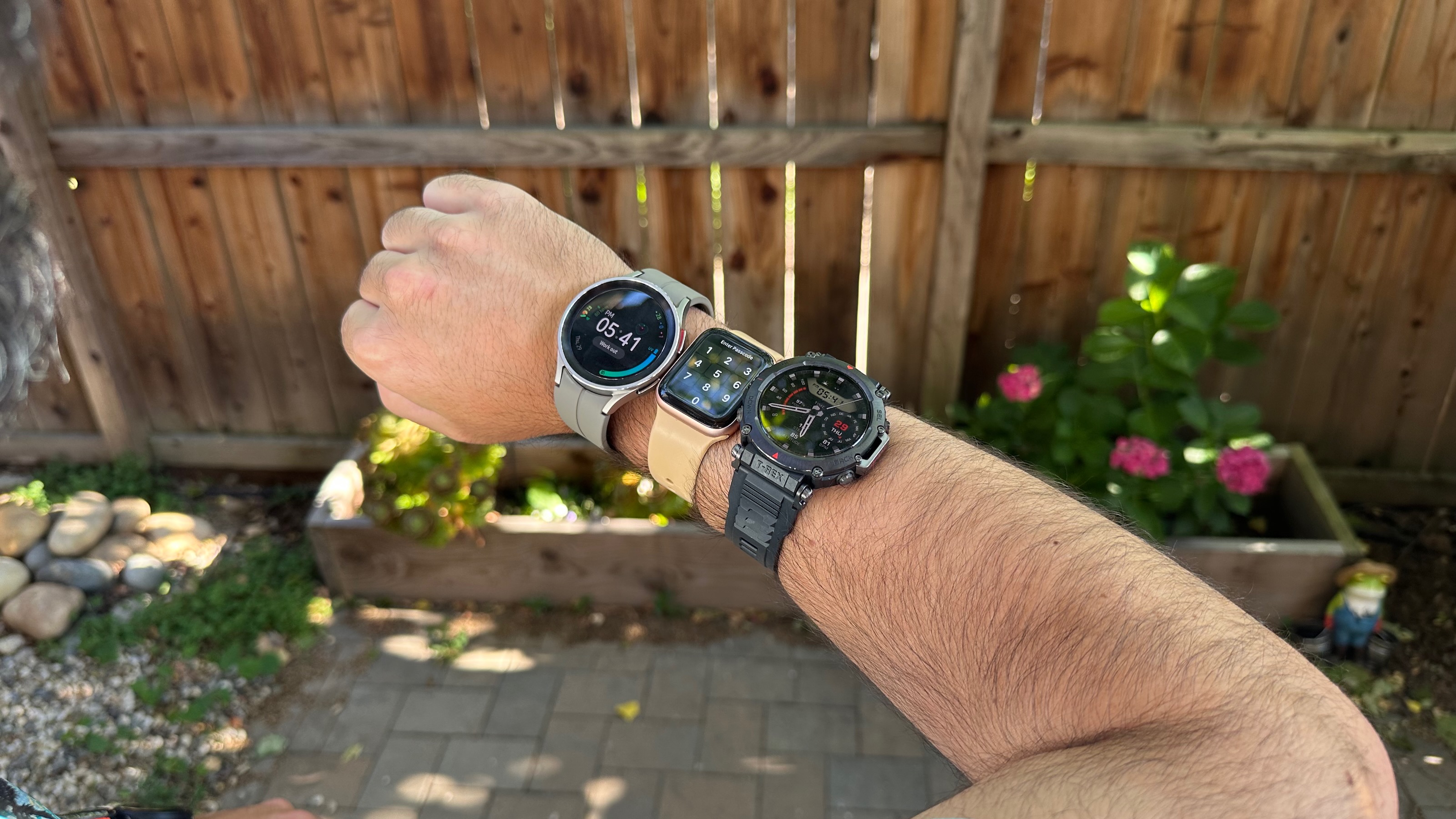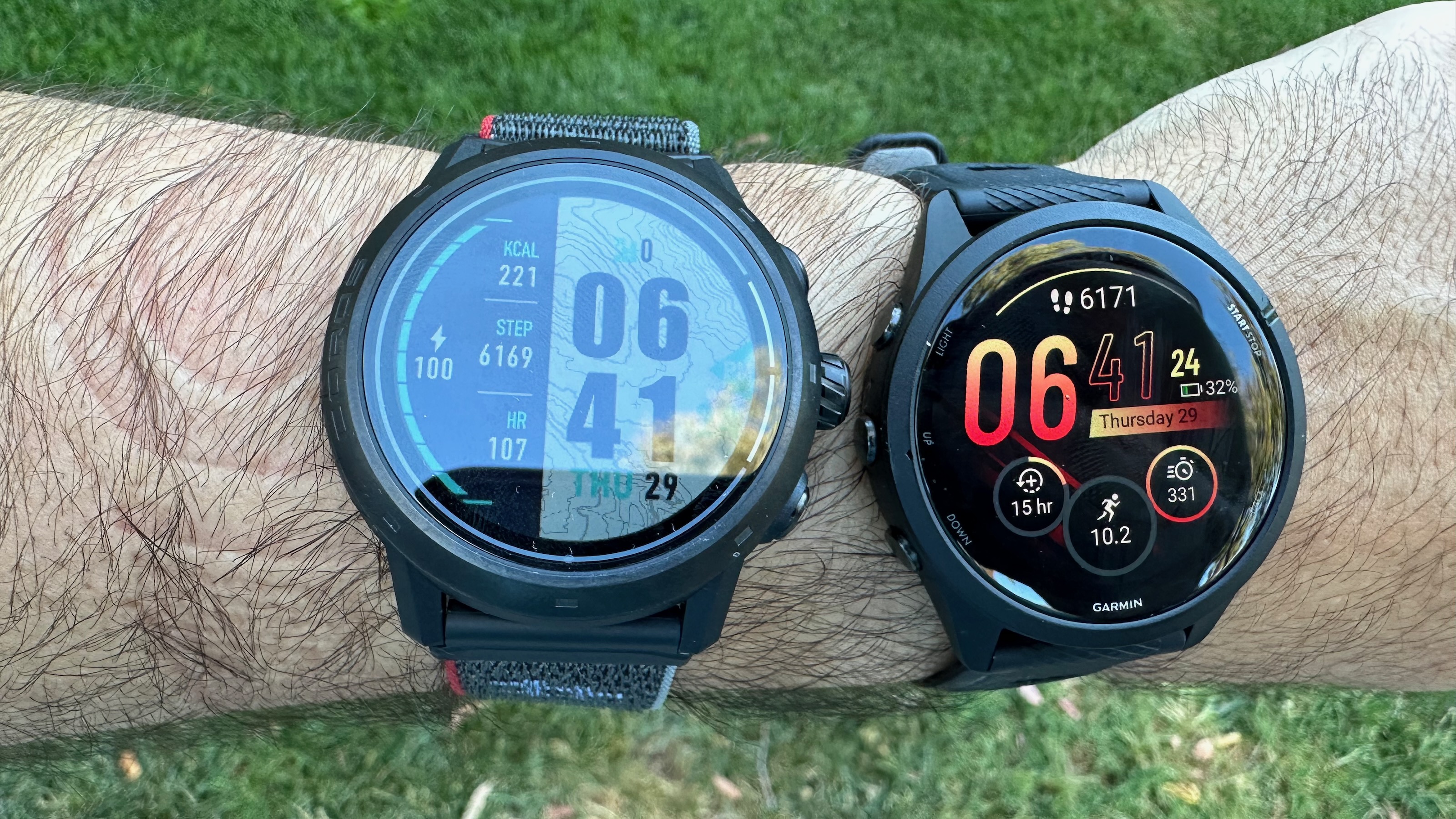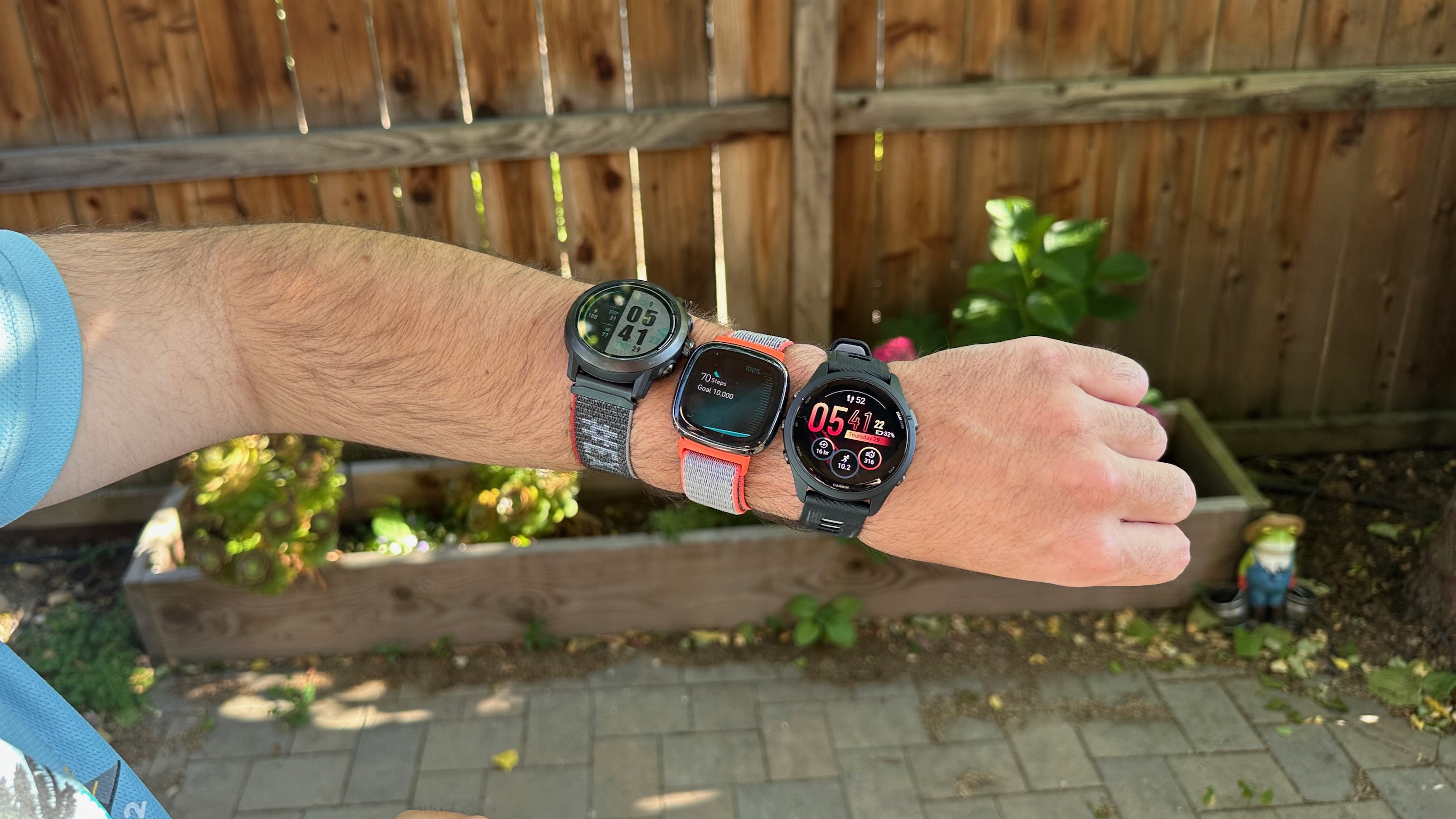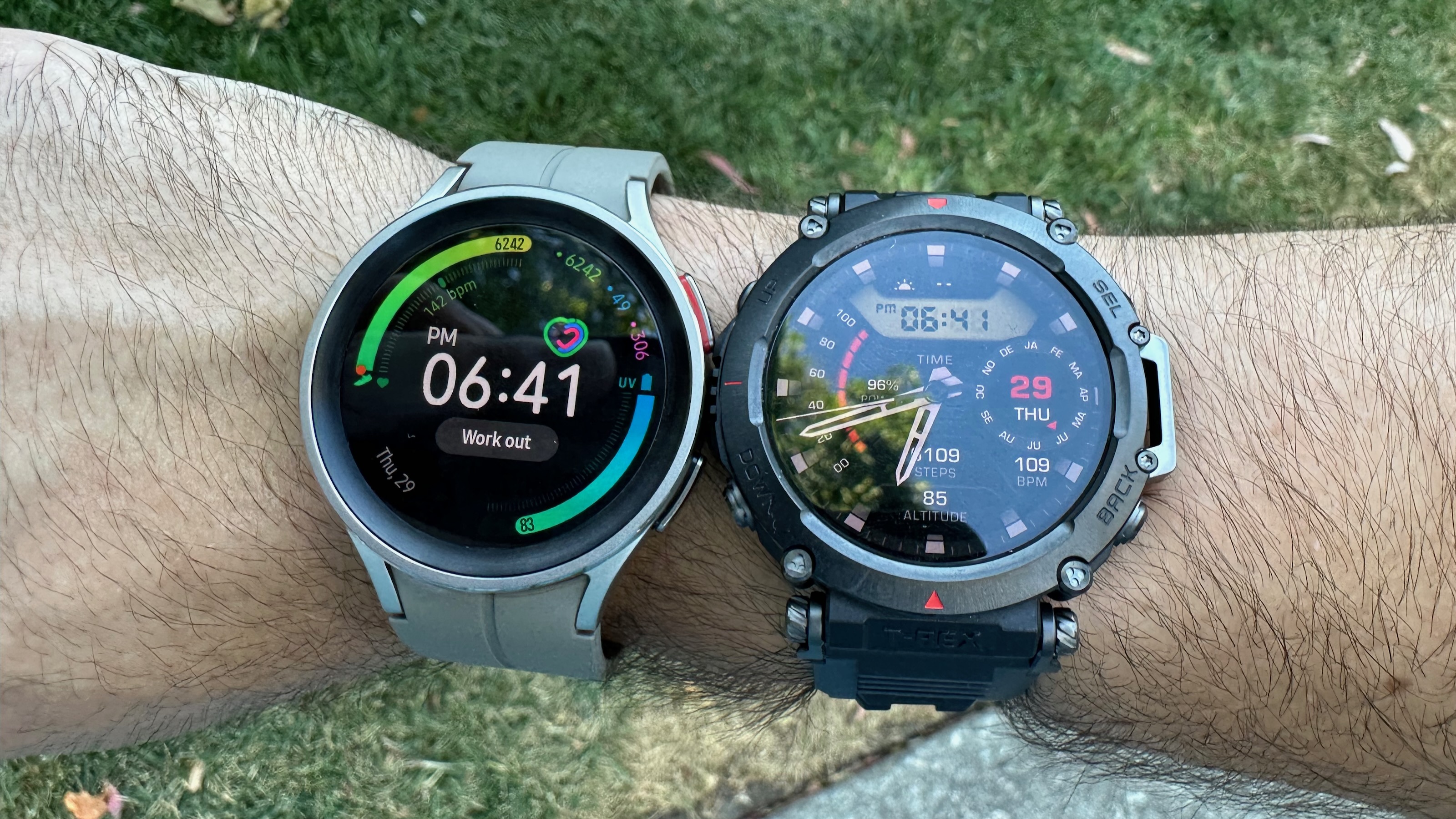
Doctors tell us to try and get 10,000 steps a day, but almost no one uses a pedometer to check. Instead, we rely on our fitness smartwatches to tell us when we've hit our goal. But should you trust your watch's step counter accuracy?
I decided to test this for myself. I strapped on six smartwatches at once — an Apple Watch Series 6, Galaxy Watch 5 Pro, Garmin Forerunner 265, COROS APEX 2 Pro, Fitbit Sense, and Amazfit T-Rex Ultra — and walked laps around my neighborhood while counting every single step in my head (and oh boy, was it tedious).
Once I hit 5,000 steps, I compared the real-world number against what each watch said. Then I ran an additional 1,000 steps, checking to see if it was any more or less accurate if I was moving at a faster pace with longer strides.
So, are smartwatches accurate for step counting? It depends on which brand you own.

In his new weekly column, Android Central Fitness Editor Michael Hicks talks about the world of wearables, apps, and overall fitness tech related to running and health.
I specifically subtracted any "steps" taken before the test started. This made the starting conditions equal, but also erased the most common cause of step-counter inaccuracy: watches' accelerometers and/or gyroscopes measuring "steps" from you just moving your arms around as part of daily life.
That aside, here were my smartwatch step counter test results after walking 5,000 steps and running 1,000 steps:
- Amazfit T-Rex Ultra: 5,046 walking, 984 running
- Apple Watch: 4,940 walking, 1,050 running
- COROS APEX 2 Pro: 5,070 walking, 989 running
- Fitbit Sense: 4,714 walking, 994 running
- Garmin Forerunner 265: 5,014 walking, 999 running
- Samsung Galaxy Watch 5 Pro: 5,074 walking, 1,039 running
Ignoring the Fitbit Sense's surprisingly inaccurate walking results for a moment, you can see that most of these watches fall within a ±100-step range of the real result — or double that for 10,000 steps. So if you go out for a walk and hit 10K, you can generally assume you're not too far off the mark.
The running results only look more accurate at first glance; quintuple the difference, and you can see how, in particular, the Apple Watch Series 6 and Samsung Galaxy Watch 5 Pro struggle to accurately count running strides, compared to walking. Dedicated running watches do better, including Fitbit (despite its early step-counting struggles).
Ranking them for closest accuracy, the Garmin Forerunner 265 is the clear winner, just 15 steps off in total and only 1 off for running tracking. Amazfit's flagship watch (62 steps off) and the COROS APEX 2 Pro (81) take second and third place, both predictably doing well for running data. Apple (110), Samsung (113), and Fitbit (292) take up the final three spots.

[Before anyone gets up in arms, I'm aware the math says Apple was only 10 steps off 6,000 because it was 60 short for walking and 50 long for running, the two inaccuracies canceling each other out. That's not how I chose to measure accuracy, because someone either only walking or only running wouldn't get a super-accurate result.]
As a final point, I also kept an Android phone (the Samsung Galaxy S22+) in my pocket during my walk/run, as a baseline to compare and see if you don't even need a smartwatch for step counting. The results? 5069 and 998. That last result definitely surprised me, as it did far better than Samsung's own top-tier watch. Generally speaking, it's pretty accurate, about on par with Amazfit and COROS; you just don't get all of the other health-tracking benefits that a smartwatch offers.
Analyzing my totally unscientific smartwatch step-counting test

I had no idea how tedious it would be to find a bunch of dead watches sitting in my closet, find all the proprietary charging cables, recharge and update them one by one, sync them to my Android phone or iPhone, and then squeeze three watches onto each wrist. In theory, a watch being slightly higher on my arm could have affected the results a bit, so I did my best to mitigate that and kept them close together.
Then I walked in 93º weather while all of my neighbors gave me very judgy and confused stares (aka "Why the heck is this weirdo wearing six watches? Is he the Clock King?"), trying to keep count in my head while keeping a consistent walking pace.
So, yeah, I thought about doing the test again, possibly with other watches from the same brands, or just to see if the winners and losers were consistent. But no way am I doing it again, sorry friends! You can try the experiment at home yourself to see what results you get, if you want.
I don't own (or couldn't fit) every smartwatch brand; I missed a lot of Wear OS watches like Pixel Watch, TicWatch, and Fossil Gen 6, as well as other running brands like Polar.
Moreover, I don't have the latest versions of certain brands' flagship watches like the Fitbit Sense 2 or Apple Watch Series 8. But to be fair, you almost never hear anything about a watch's accelerometer being X% more accurate than the last generation in marketing materials. It's not clear how many brands are actually improving them from year to year, now that they've hit a certain baseline of accuracy.

The point is, this is hardly a scientific test, and you might have very different results depending on your height, walking stride, cadence, and other factors. Plus, like I said before, everyday false positives for steps are a real problem.
Even though the Garmin Forerunner 265 won the battle for step accuracy, I have noticed my step count climbing when doing nothing but sitting at my desk. Something as simple as stretching or pointing at something can trigger it. And when walking without a natural arm motion, such as when I'm holding a phone in my hand, the lack of back-and-forth movement can befuddle the accelerometer.
The point is, if you do want to walk 10,000 steps a day, or whatever step count your watch's health algorithm recommends, you may want to take false steps into account and walk a couple hundred extra steps, just to be safe. Though in Fitbit's case, you can assume you're already well above 10K once you hit it.
My personal step count average over the last six months is, ironically, 6,000 steps (give or take a hundred steps, I suppose). My goal is to try and keep raising that number by the time I hit 2024, as I strive to improve my VO2 Max and other metrics.
So I'm happy that my daily Garmin watch, the Forerunner 265, is pretty darn accurate on step counting, even if they still have room for improvement. Add to that the fact that it's also among the most accurate when it comes to GPS tracking, and it's no fluke that it sits on the top of our best running watches list.
But for people with standard lifestyle watches like the Apple Watch or Galaxy Watch, 200 steps off the mark after 10,000 total isn't so terrible that you should think seriously about switching brands. It's just something to be aware of!
Why accurate step counting matters

According to a study by the Journal of American Medical Association, walking 10,000 steps a day leads to reduced risk for cardiovascular disease, cancer, or mortality in general for older patients. The NIH found that for high blood pressure patients, three months of daily walking reduces your average systolic score by about 10 points.
Consistent walking can improve cognitive function and memory, according to an Alzheimer's journal study, as well as your mood. Your muscles are strengthened, combatting natural muscle weakness and shakiness from aging. It not only makes contracting Type 2 diabetes less likely but also helps stabilize your blood sugar if you have diabetes.
Plus, of course, there's the obvious benefit that walking about five miles will burn hundreds of calories — likely somewhere between 300 and 600, depending on your weight and pace.
All of this helps explain why so many of the best fitness smartwatches incorporate step counting into their watch faces and health snapshots. It's the one metric that gives health benefits across the board, especially for middle-aged-and-older users facing serious ailments.







